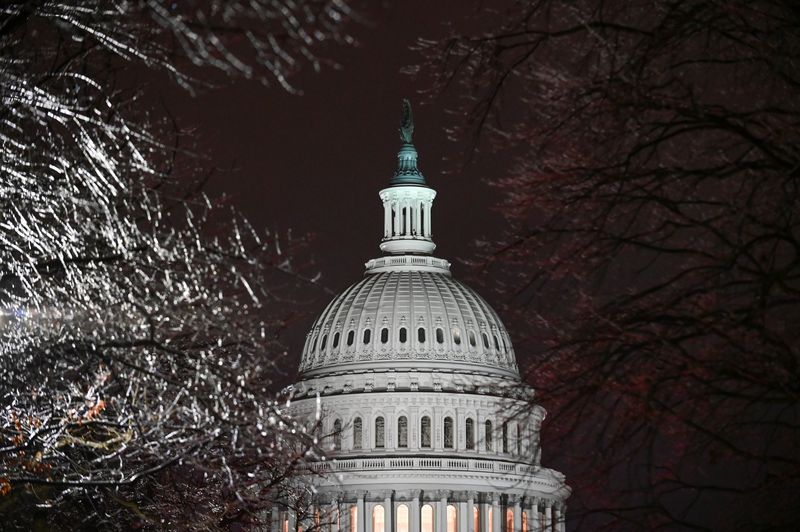By Jeff Mason and Susan Cornwell
WASHINGTON (Reuters) - Former President Donald Trump's acquittal on charges of inciting a deadly attack on the U.S. Capitol left Democrats and Republicans deeply divided on Sunday even as his Democratic successor, Joe Biden, sought to move on with his political and economic agenda.
Democrats said they looked to the courts for possible civil and criminal charges against the former Republican president over the assault by his supporters on Jan. 6, which left five people dead.
The Senate trial concluded on Saturday with a 57-43 vote in favor of convicting Trump. The vote was bipartisan, with seven Republicans joining Democrats and independents, but the tally fell short of the two-thirds needed to secure conviction.
After the verdict, a fractured Republican party was battling over the way forward, with some senators who voted to convict facing swift backlash in their home states.
Trump ally Senator Lindsey Graham said he had talked to Trump on Saturday night about uniting the Republican party under his leadership.
"You know, he is ready to move on and rebuild the Republican Party. He's excited about 2022," Graham told Fox News Sunday, referring to congressional elections next year.
But Senator Bill Cassidy, one of the Republicans who found Trump guilty, said on Sunday he believed more of his constituents would come to agree with him as the facts became known. Republican party leaders in Cassidy's home state of Louisiana voted on Saturday to censure the senator for his vote.
"I'm attempting to hold President Trump accountable ... I am very confident as time passes, people will move to that position," Cassidy said on ABC's "This Week" when asked about censure.
The party leader in Pennsylvania, Lawrence Tabas, also criticized its Republican Senator Pat Toomey for voting to convict.
Some Republicans, including Senate Minority Leader Mitch McConnell, criticized Trump's actions on Jan. 6 even as they voted to acquit him. McConnell blasted the former president on Saturday as morally responsible for the Capitol attack, but said he didn't vote to convict because Trump was no longer in office.
Cassidy declined to say whether Trump should face criminal charges. But Democratic Senator Chris Coons told ABC he thought this could happen.
"I think there's ground for further proceedings, both civil and criminal, against former President Trump," Coons said.
Coons said the country needed to set up a 9/11-style commission to investigate the events of Jan. 6. But he and other Democrats said it was the correct decision not to call witnesses in the Senate trial. Calling witnesses might have prolonged the trial by weeks and even lost some votes to convict on the Republican side, Democratic Senator Chris Murphy told CNN.
'DEMOCRACY IS FRAGILE'
The assault on the Capitol forced lawmakers to evacuate congressional chambers in fear for their safety in the middle certifying Biden's win in the November election, which Trump falsely maintained he lost due to widespread electoral fraud.
Biden, who took office on Jan. 20, appealed for unity to "heal this uncivil war and heal the very soul of our nation," saying each American had a duty and a responsibility to defend the truth.
"This sad chapter in our history has reminded us that democracy is fragile. That it must always be defended. That we must be ever vigilant. That violence and extremism has no place in America," Biden said in a statement.
Trump, while hailing the acquittal, called the House impeachment and trial in the Senate a "witch hunt." Trump is the only president in U.S. history to be impeached twice.
Democratic Speaker of the House of Representatives Nancy Pelosi called Republicans who did not support conviction “cowardly.”
Biden, who stayed largely out of the fray during the impeachment proceedings, is eager to pass a $1.9 trillion pandemic relief bill and have the remaining nominees for his Cabinet confirmed by the Senate. But lawmakers' disagreements are likely to linger.
The Republican Senators who voted in favor of conviction also included Richard Burr, Susan Collins, Lisa Murkowski, Mitt Romney and Ben Sasse.
Murkowski, of Alaska, is the only one of the seven up for re-election in 2022. The other six either are retiring from Congress or their six-year terms do not expire that year.
Murkowski published a defense of her decision on Twitter on Sunday, saying that if Trump's actions were not worthy of impeachment, "I cannot imagine what is."

Trump has repeatedly threatened to go after Republicans who do not support him by endorsing opponents in their primary elections. On Saturday he indicated he was thinking about his own political future, without divulging details.